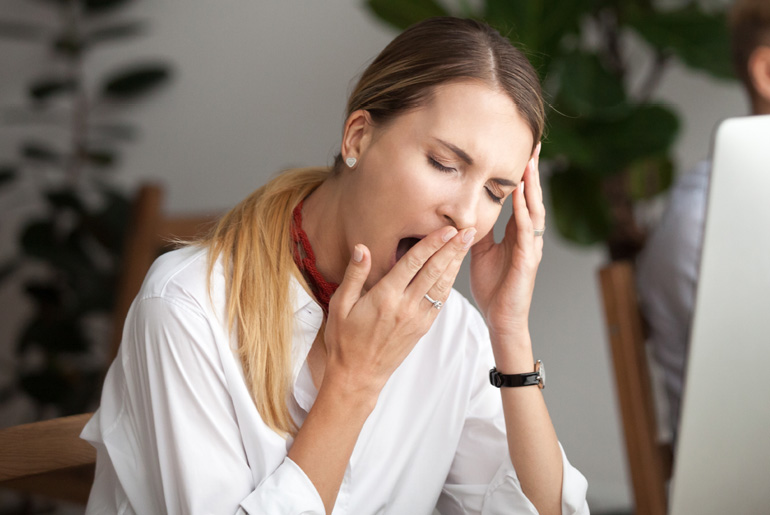Afternoon Energy Slump? Tips to Get Your Zing Back!

Does your energy slump in the afternoon? Here are some tips to help you avoid the afternoon energy crash.
What Causes the Afternoon Crash?
Your body’s natural internal clock is partly to blame for the afternoon energy dip. Everyone’s energy level ebbs and flows during a 24-hour period. For most of us, the strongest drive to sleep comes on a few hours after midnight. Another dip, although not usually quite as powerful, also naturally occurs early or mid-afternoon. By that time of day, most people have been up and alert for about 6-8 hours, and the natural need for sleep is starting to build. And you feel the crash coming on.
Since these internal rhythms can get disrupted or accentuated when you don’t get enough sleep, establishing a healthy sleep schedule is really important in helping you maintain your energy all day long.
What and when you eat are important factors.
The Right Carbs Help Keep You Energised All Day Long
Many people get an energy slump in the afternoon because they’re eating the wrong carbohydrates. They’ll start the day with something like a sugary cereal, which causes the blood sugar to shoot up, and almost as quickly back down again. That might trigger a sugar craving, which some might satisfy with a pastry or some candy. And the cycle repeats. Since they’re not providing their body with a slow, steady fuel source, their energy levels might feel like a roller-coaster all day long.
On the other hand, when you get your carbohydrates from foods like vegetables, whole fruits and whole grains, these take longer to digest. Instead of causing a big spike in your blood sugar, eating these foods allows glucose to slowly enter the bloodstream and help provide more sustained energy over a longer period of time.
How to Eat to Keep Up Afternoon Energy Levels
In order to keep your energy levels up and avoid the afternoon energy slump, you need well-balanced meals and snacks—and you need to eat every few hours. People who skip meals just can’t keep going all day long. When you don’t eat at regular intervals, your blood sugar is going to drop and take your energy level along with it.
Just as not eating enough can sap your energy, eating too much at lunch can make you feel sluggish in the afternoon. Unfortunately, some people do both. They skip breakfast then eat an enormous lunch because they’re starving, and then wonder why they’re out of steam most of the day. When you eat a big, heavy meal, a lot of energy is required to digest it. As blood gets diverted towards your digestive tract to help the process along, you’ll start feeling the need to take a nap.
Some people rely on caffeinated beverages in order to stay alert. This isn’t a problem either, unless caffeine interferes with your ability to get a good night’s sleep. Make sure your lunch includes some low-fat protein to help fight hunger, and a supply of good carbs to provide you with a steady energy source. A mixed vegetable salad with some grilled fish, a chicken and veggie stir-fry with brown rice, or a protein shake with fruit can all fill the bill at lunch time.
A mid-afternoon snack that includes protein should also be part of your overall plan. A lot of people try to get by without snacking because they feel it adds extra calories to their day, but they usually just make up for it by eating a really big dinner.
Protein shakes work well as a mid-afternoon snack. Or you can also try a protein bar, a carton of yoghurt with some fruit, some raw veggies with hummus, or a can of tuna with a handful of cherry tomatoes. Again, the combination of lean protein and beneficial carbohydrates will help keep the afternoon slump away and help keep you satisfied – and energised – all afternoon long.
By SUSAN BOWERMAN
MS, RD, CSSD, CSOWM, FAND,
Senior Director,
Worldwide Nutrition Education and Training, Herbalife Nutrition.





